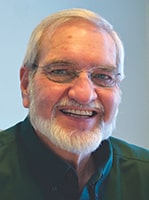
“To maintain brain fitness, it is important to focus your attention on other people and other things. Never give up your interest in other people and other things.” — Vernon H. Mark, M.D., “Reversing Memory Loss”
Adults who maintain an active social life with their family, friends, and social organizations maintain higher mental functions and are more satisfied with life than those who “cocoon socially” in their retirement years. As we age, here are three social things we need to do to improve our mental functions:

Frank Fain
Socialize with friends once a week. Studies have found two consistent benefits for individuals who weekly socialize with friends. First, they maintain higher mental functions. Second, they live on average 3-4 years longer than individuals who do not weekly socialize. Sharing a meal, playing table games, a day of shopping, conversation over a cup of coffee, just about any activity where we regularly interact with friends is very beneficial to our mental and emotional health.
Develop intergenerational friendships. As we age, our circle of friends shrinks due to folks relocating, declining health, and death. As we age it is very important for us to continue to develop new relationships with individuals from different age groups.

Photo by Nathan Anderson on Unsplash
Intergenerational friendships are very beneficial for everyone. Younger people get the benefit of wise counsel and mentoring. For older people, the interaction keeps their minds sharp, broadens their perspective on life, and helps them keep connected to the treads, interests, and values of others. Also, older adults with friends from other generations have a more optimistic attitude about life and the future than those who just have friends from their age group.
Keep active in church and community organizations. MacArthur Foundation’s studies discovered those who maintain their mental abilities later into life also are those who are very active in spiritual and other community organizations.
When we retire from our occupation we tend to also want to “retire” from church and community leadership positions. We need to rethink that attitude if we desire to keep mentally sharp as we age. Set a personal goal to accept new leadership opportunities that match our talents, abilities, and enthusiasm.
Developing and maintaining active social life as we age will lead us to have a higher satisfaction with life and help keep our brain young and active.


